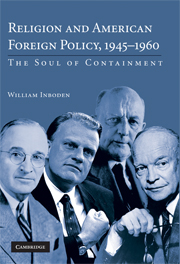Book contents
- Frontmatter
- Contents
- Preface and Acknowledgments
- Introduction
- PART ONE
- PART TWO
- 3 The “Real” Truman Doctrine: Harry Truman's Theology of Containment
- 4 To Save China: Protestant Missionaries and Sino–American Relations
- 5 Guided by God: The Unusual Decision-Making of Senator H. Alexander Smith
- 6 Chosen by God: John Foster Dulles and America
- 7 Prophet, Priest, and President: Dwight D. Eisenhower and the New American Faith
- Afterword
- Bibliography
- Index
- References
6 - Chosen by God: John Foster Dulles and America
Published online by Cambridge University Press: 31 July 2009
- Frontmatter
- Contents
- Preface and Acknowledgments
- Introduction
- PART ONE
- PART TWO
- 3 The “Real” Truman Doctrine: Harry Truman's Theology of Containment
- 4 To Save China: Protestant Missionaries and Sino–American Relations
- 5 Guided by God: The Unusual Decision-Making of Senator H. Alexander Smith
- 6 Chosen by God: John Foster Dulles and America
- 7 Prophet, Priest, and President: Dwight D. Eisenhower and the New American Faith
- Afterword
- Bibliography
- Index
- References
Summary
John Foster Dulles faced the same problem that had troubled his Puritan forefathers three centuries before. As Edmund Morgan memorably posed it, the “Puritan dilemma” of the seventeenth century entailed trying to live virtuously in a fallen world without in turn falling to the corruptions of that world. Though Puritanism as a movement eventually disappeared, the Puritan dilemma persisted – at least for all successive religious Americans who refused either to conform to the world or to separate from the world. Dulles encountered the same dilemma in a different guise. He envisioned a world governed by God. In this world, all people shared bonds as members of one human family, enjoyed peace, liberty, and goodwill, and honored the divinely ordained universal moral law. When Dulles looked at the world he lived in, however, he confronted a jarring reality that bore little resemblance to his idyllic vision. War and conflict, nationalism and division, and pernicious ideologies such as atheistic communism combined to tarnish his utopian ideal. In one sense, his entire foreign policy career can be understood as a series of continuing efforts to reconcile the dreams he held with the reality he faced.
Many biographers of John Foster Dulles try to resolve his dilemma by describing Dulles as not one, but two men. The “early Dulles,” they say, worked to promote global ideals such as peace, dialogue, and the spiritual brotherhood of man. The “later Dulles” embraced a hardened, nationalist worldview as a calculating Cold Warrior.
- Type
- Chapter
- Information
- Religion and American Foreign Policy, 1945–1960The Soul of Containment, pp. 226 - 256Publisher: Cambridge University PressPrint publication year: 2008

